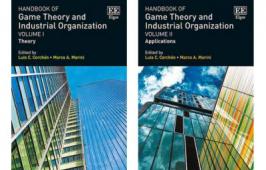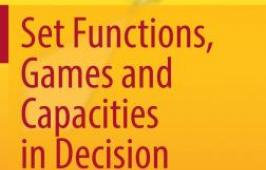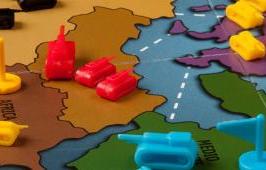Game Theory & Graphs
Graph-theoretic models for multiplayer games - known as graphical games - have nice computational properties and are most appropriate for large population games in which the payoffs for each player are determined by the actions of only a small subpopulation.
Related posts
|
Working paper Divide and Choose among two agents, and the Diminishing Share (DS) and Moving | READ MORE ... |
Other Divide and Choose among two agents, and the Diminishing Share (DS) and Moving | READ MORE ... |
Article |
|
Article The paper considers a class of decision problems with an infinite time horizon | READ MORE ... |
Article We consider positive zero-sum stochastic games with countable state and action | READ MORE ... |
Working paper Candogan et al. (2011) provide an orthogonal direct-sum decomposition of finite | READ MORE ... |
|
Article We propose an analytical approach to the problem of influence maximization in a | READ MORE ... |
Article We address the problem of how to define an importance index in multicriteria | READ MORE ... |
Article We introduce the new concept of prudent equilibrium to model strategic | READ MORE ... |
|
Article Consider a society with two sectors (issues or objects) that faces a design | READ MORE ... |
Article This paper studies adaptive learning in the class of weighted network games. | READ MORE ... |
Article We study perfect information games played by an infinite sequence of players, | READ MORE ... |
|
Article In many situations, agents are involved in an allocation problem that is | READ MORE ... |
Article The estate division problem considers the issue of dividing an estate when the | READ MORE ... |
Working paper We provide a first study of the threshold model, where both conformist and anti | READ MORE ... |
|
Article We investigate how, in a situation with two players in which noncooperation is | READ MORE ... |
Article We introduce a new solution concept for models of coalition formation, called | READ MORE ... |
Working paper We study games with almost perfect information and an infinite time horizon. In | READ MORE ... |
|
Working paper Farsighted deviations are based on agents’ abilities to compare the outcome
of | READ MORE ... |
Article For single decision maker optimization problems that lack time efficient | READ MORE ... |
Article |
|
Article Growing concerns about climate change impacts on humans and eco-systems | READ MORE ... |
Article We analyze a Sender–Receiver game in which the Sender can choose between a | READ MORE ... |
Article The stability of Nash equilibria has often been studied by examining the | READ MORE ... |
|
Article In this paper, we introduce a notion of epistemic equivalence between | READ MORE ... |
Book The concept of fair division is as old as civil society itself. Aristotle' | READ MORE ... |
Article In this paper we introduce a novel framework that allows us to model games with | READ MORE ... |
|
Article We study common belief of weak-dominance rationality in strategic-form games | READ MORE ... |
Working paper A partially-honest individual is a person who follows the maxim, "Do not | READ MORE ... |
Article This paper investigates the robustness of Dutta and Sen's (2012) Theorem 1 | READ MORE ... |
|
Working paper We study the formation of R&D networks when each Örm beneÖts from the | READ MORE ... |
Working paper We study the formation of networks where myopic and farsighted individuals | READ MORE ... |
Article In this note, we extend Aumann’s agreement theorem to a framework where beliefs | READ MORE ... |
|
Article We introduce a stochastic learning process called the dampened gradient | READ MORE ... |
Working paper We present a general existence result for a type of equilibrium in normal-form | READ MORE ... |
Article When rationing a resource or adjudicating conflicting claims, the arrival of | READ MORE ... |
|
Working paper We consider two versions of a Bertrand duopoly with asymmetric costs and | READ MORE ... |
Article We study the division of a surplus under majoritarian bargaining in the three- | READ MORE ... |
Working paper We analyze a model of information centralization in teams where players can | READ MORE ... |
|
Working paper It is shown that any one-person dominant strategy implementable allocation | READ MORE ... |
Article We study a variation of Hotelling’s location model in which consumers choose | READ MORE ... |
New books The first volume of this wide-ranging Handbook contains original contributions | READ MORE ... |
|
Article Bloch and de Clippel (J Econ Theory 145:2424–2434, 2010) characterized sets of | READ MORE ... |
Article This paper substitutes the standard rationality assumption with approximate | READ MORE ... |
Article This paper uses a dynamic stochastic model to solve for the optimal pricing | READ MORE ... |
|
Article We provide a characterization of subgame-perfect equilibrium plays in a class | READ MORE ... |
Article We show the existence of a Cournot–Nash equilibrium for a mixed version of the | READ MORE ... |
Article We consider n-player perfect information games with payoff functions having a | READ MORE ... |
|
From theory to application . |
Article All equilibrium concepts implicitly make a correct beliefs assumption, stating | READ MORE ... |
Article We study the stable market outcome that evolves in a spatially differentiated | READ MORE ... |
|
Working paper We use a comprehensive model of strategic household behaviour in
which the | READ MORE ... |
Working paper We consider a Sender-Receiver game in which the Sender can choose between | READ MORE ... |
Working paper We propose a framework for the analysis of choice behavior when the later | READ MORE ... |
|
Working paper This paper explores a voluntary contribution game in the presence of warm-glow | READ MORE ... |
Working paper We study mechanisms for environments in which only some of the agents are | READ MORE ... |
Article We show the existence of a Cournot–Nash equilibrium for a mixed version of the | READ MORE ... |
|
Article In a biased contest, one of the players has an advantage in the winner | READ MORE ... |
Working paper We provide an analytical approach to the problem of influence maximization in a | READ MORE ... |
Working paper The paper defines a family of nested non-cooperative simultaneous finite games | READ MORE ... |
|
Working paper We analyze a game in which players with unique information are arranged in a | READ MORE ... |
Working paper Predictions under common knowledge of payoffs may differ from those under arbi | READ MORE ... |
Working paper A non-cooperative solution, the Equilibrium in Secure Strategies (EinSS), is | READ MORE ... |
|
Article Type structures are a simple device to describe higher-order beliefs. However, | READ MORE ... |
Article Effective responses to climate change may demand a radical shift in human | READ MORE ... |
Article We look for assignment rules meeting the powerful separability property known | READ MORE ... |
|
Article We study long-term Markov decision processes (MDPs) and gambling houses, with | READ MORE ... |
Article We consider n-player perfect information games with payoff functions having a | READ MORE ... |
Book The book provides a thorough treatment of set functions, games and capacities | READ MORE ... |
|
Article This paper introduces a class of contest models in which each player decides | READ MORE ... |
From theory to application .
|
Working paper Share equilibrium was introduced in van den Nouweland and Wooders (2011) as an | READ MORE ... |
|
Working paper We propose a cooperative solution concept for games in extensive form that | READ MORE ... |
Article This paper examines a notion of sporadic overtaking optimality in the context | READ MORE ... |
Working paper Regarding complex networks, one of the most relevant problems is to understand | READ MORE ... |
|
Working paper This article presents a stylized framework to rank languages in multilingual | READ MORE ... |
Article We prove the existence of a pure subgame–perfect epsilon–equilibrium, for every | READ MORE ... |
Working paper We study a linear location model (Hotelling, 1929) in which n (with n ≥ 2) | READ MORE ... |
|
Working paper In a network formation framework, where payoffs reflect an agent’s ability to | READ MORE ... |
Article We study centipede games played by an infinite sequence of players. Following | READ MORE ... |
Article In this paper, we describe a process of validation for an already published | READ MORE ... |
|
Article We introduce, in the standard exchange economy model, market games in which | READ MORE ... |
Article We develop a modification of the connections model by Jackson and Wolinsky that | READ MORE ... |
Working paper In a polarized committee, majority voting disenfranchises the minority. By | READ MORE ... |
|
Working paper We study whether coordination failure is more often overcome if players can | READ MORE ... |
Article We study the existence of different notions of value in two-person zero-sum | READ MORE ... |
Working paper We combine in the same theoretical framework two related phenomena that can be | READ MORE ... |
|
Working paper In a two-stage elimination math contest participants aged from 10 to 16 compete | READ MORE ... |
Working paper We show that the existence of gender differences in performance is highly | READ MORE ... |
Article We study strategies with one-period recall in the context of a general class of | READ MORE ... |
|
Alessandro Tavoni (LSE & FEEM) has published a commentary on how to use | READ MORE ... |
From theory to application Coordination is a vital element of human life, whether it be greeting each | READ MORE ... |
Working paper In this paper we develop a private-collective model of voluntary public | READ MORE ... |
|
Working paper We report on a laboratory experiment based on a stylized model of decentralized | READ MORE ... |
Working paper We study centipede games played by an infinite sequence of players. Following | READ MORE ... |
Working paper In this paper we consider two means for implementing the informational benefits | READ MORE ... |
|
Working paper We study strategic negotiation models featuring costless delay, general | READ MORE ... |
Working paper Individuals derive benefits from their connections, but these may, at the same | READ MORE ... |
Book Industrial Organization: Markets and Strategies offers an up-to-date and | READ MORE ... |
|
Working paper The aim of this paper is twofold. Starting from the population dynamics | READ MORE ... |







